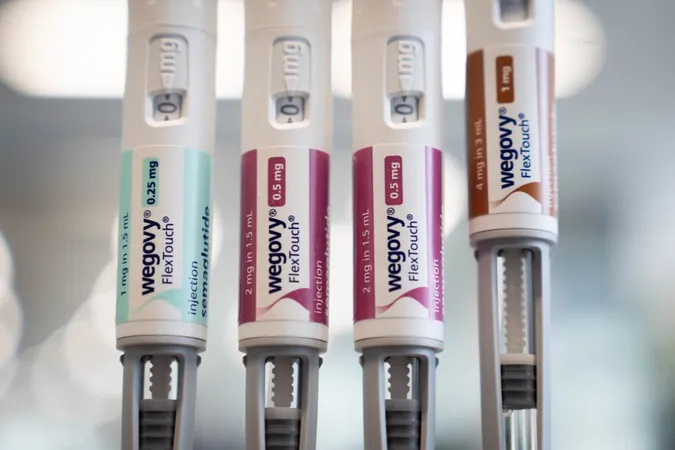
Revolutionary Breakthrough Could Eliminate Nausea from Popular Weight Loss Medications
2024-11-15
Author: Ming
Introduction
In a groundbreaking development, researchers at the University of Copenhagen have unveiled a new method that may help eliminate some of the biggest drawbacks associated with widely-used weight loss medications like Ozempic. While these drugs, primarily based on the hormone GLP-1, are praised for their ability to improve kidney function and lower the risk of heart attacks, many individuals discontinue their use due to unpleasant side effects, such as nausea and vomiting.
The New Drug Candidate
This exciting new discovery centers around a drug candidate that targets the Neurokinin 2 Receptor (NK2R). Unlike current treatments, which can lead to muscle loss and various adverse effects, the NK2R-targeting drug not only reduces appetite but also promotes calorie burning without prompting any feelings of sickness. This marks a significant shift in the landscape of obesity and type 2 diabetes treatments, offering hope to millions who struggle with weight management and have faced challenges with existing options.
Research Findings
Published in the prestigious journal Nature, the researchers conducted experiments on mice that indicated activating the NK2R could help regulate energy balance and glucose control effectively. The results were staggering: the activation of this receptor increased calorie expenditure while simultaneously suppressing appetite, and crucially, it did so without causing nausea—a common concern among patients using GLP-1 therapies.
Success in Nonhuman Primates
Further studies involving nonhuman primates that were diabetic and overweight showcased the drug's potential in reversing diabetes, as it improved insulin sensitivity and lowered levels of blood sugar, triglycerides, and cholesterol. This promising outcome suggests that a better-tolerated treatment may soon be accessible to those battling obesity and metabolic disorders.
Expert Insight
Dr. Zach Gerhart-Hines, an associate professor at the NNF Foundation Centre for Basic Metabolic Research (CBMR), emphasized the importance of this breakthrough: 'GLP-1-based therapies have already transformed care for obesity and type 2 diabetes, but achieving energy expenditure regulation and appetite control without nausea has always been the 'holy grail' in our field. Our findings could make these effective treatments more accessible to millions.'
Challenges Ahead
The research team, led by PhD student Frederike Sass, acknowledges that one of the greatest challenges in drug development lies in the difference between animal models and human reactions. However, the successful outcomes observed in both mice and now primate models bring renewed optimism for the future of obesity treatments. This pivotal advancement could mean that soon, people everywhere will have access to safer and more effective weight loss solutions that don't have the troublesome side effects associated with current medications.
Conclusion
As the quest for effective solutions to combat obesity and type 2 diabetes continues, this innovative drug candidate shines a light on a promising path forward—one where negative side effects could become a thing of the past. Stay tuned for more updates on this fascinating topic as researchers work toward clinical trials and real-world applications.




 Brasil (PT)
Brasil (PT)
 Canada (EN)
Canada (EN)
 Chile (ES)
Chile (ES)
 España (ES)
España (ES)
 France (FR)
France (FR)
 Hong Kong (EN)
Hong Kong (EN)
 Italia (IT)
Italia (IT)
 日本 (JA)
日本 (JA)
 Magyarország (HU)
Magyarország (HU)
 Norge (NO)
Norge (NO)
 Polska (PL)
Polska (PL)
 Schweiz (DE)
Schweiz (DE)
 Singapore (EN)
Singapore (EN)
 Sverige (SV)
Sverige (SV)
 Suomi (FI)
Suomi (FI)
 Türkiye (TR)
Türkiye (TR)